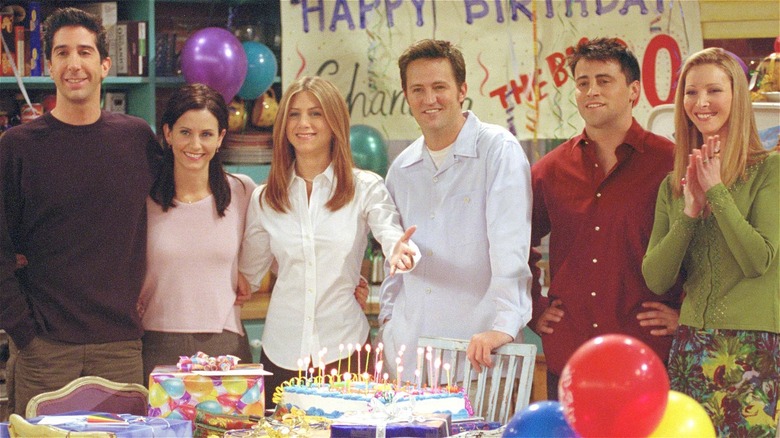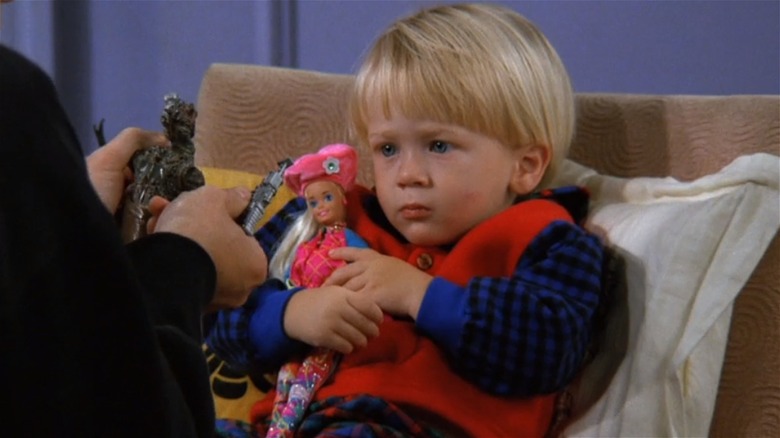The Historic Friends Episode That Wasn't Nearly As Controversial As Execs Expected
Despite ending in 2004, "Friends" stands as one of the most renowned television series in history to this day. HBO Max, the streaming platform hosting the beloved NBC sitcom, declared "Friends" its most-watched show since its inception. It's easy to see why — "Friends" never fails to make us laugh. The comedic escapades of the six pals as they navigate the intricacies of life in New York City provide a timeless source of amusement, consistently delivering the comforting feeling we seek when settling down in front of the TV.
Nonetheless, there was an episode the execs weren't sure would pass. The one where Carol (Jane Sibbett) gets married to her girlfriend, Susan (Jessica Hecht), caused unease among the decision-makers, as they anticipated a less-than-enthusiastic reception due to the relatively uncommon and less widely accepted LGBTQ+ representation at the time. However, contrary to their concerns and preparations for potential backlash, the episode not only fared well but also became one of the most iconic segments of the entire show.
While "Friends" did not extensively explore LGBTQ+ issues, nor did it attempt to be a trailblazer in this regard, the episode in question was part of a broader cultural shift. It contributed to the increased visibility and acceptance of LGBTQ+ characters and storylines in mainstream media during the '90s. Still, "Friends” has not been immune to criticism for some of its content that doesn't translate well in modern times.
The groundbreaking episode proved to be a triumph
The episode in question, aptly titled "The One with the Lesbian Wedding," caused quite a stir among "Friends" executives. As long-time fans of the hit sitcom will know, David Schwimmer's character, Ross, got divorced because his wife, Carol, came out as a lesbian. Following their separation, Carol got together with Susan, and the two eventually tied the knot onscreen. Marta Kauffman, one of the co-creators of the series, disclosed to The Hollywood Reporter that there was widespread concern behind the scenes at NBC at the time.
As a result, they "put 104 operators on for fear of getting a million phone calls. They got two." Prior to its 1996 airing, two local NBC affiliates took the controversial step of banning the episode, generating national headlines and a statement from GLAAD. Despite this, it proved to be a massive success, drawing in over 30 million viewers. Moreover, it was a pivotal moment for many viewers.
Actor Jane Sibbett, who played Carol, shared an impactful encounter on "Lorraine," when a gay man who was presenting an award to her acknowledged that having role models like Carol and Susan during his youth would have helped him be more accepting of his sexuality. Contrary to expectations, the episode did not ignite controversy but rather celebrated love, leaving an enduring impact decades later. Other installments, unfortunately, had the opposite effect.
Some episodes haven't stood the test of time
While "Friends" remains beloved all over the world, certain jokes and scenes from the show are now viewed with a more critical lens, and they have nothing to do with same-sex marriage. One example is "The One with the Breast Milk," where Joey (Matt LeBlanc) and Chandler (Matthew Perry) express discomfort with Carol breastfeeding without covering up first. "There's a baby sucking on it," Joey says to Ross when confronted about his inability to handle seeing the natural act. Joey's sexual objectification of breastfeeding would likely not fly these days.
Another side-eye-worthy episode is "The One with the Metaphorical Tunnel," where Ross has an issue with his son playing with a Barbie doll. While toxic masculinity was significantly more prevalent in the '90s, Ross is very much the butt of the joke here, with the other characters calling him out for finding Ben's toy preference concerning. "Ross, you are so pathetic. Why can't your son just play with his doll?" Rachel asks after he tries to replace the Barbie with a G.I. Joe.
There were numerous other questionable themes in the show, which the creators have previously addressed, as well as some of the actors. As co-creator Marta Kauffman admitted to the Los Angeles Times, "I'm embarrassed that I didn't know better 25 years ago." On the other hand, Jennifer Aniston feels that certain "Friends" moments didn't age well because people are more sensitive nowadays, as she told the New York Post. Clearly, some things are outdated for a reason.

